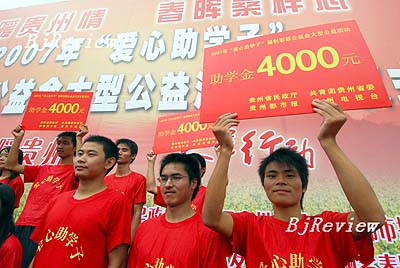|

On November 27, 2007, a man in his 40s from Jiayuguan City in northwestern Gansu Province became the biggest millionaire created by lottery games in China. The 21 firsts and 15 seconds the anonymous man scored in the "two-colored balls" game skyrocketed his winnings to 113 million yuan ($15.3 million).
It was an eventful year for the lottery industry in China. As the industry walked into its 20th year, the population of lottery players reached nearly 100 million.
In 1987, the debut year of the lottery industry in China, the total sale of lottery tickets was less than 20 million yuan (about $5.4 million back then). The sale for 2006 grew by over 4,600 times to 81.3 billion yuan ($11 billion). It is estimated that sales for 2007 will achieve a new record of 100 billion yuan ($13.5 billion).
"The annual per-capita spending on lottery in China is less than 100 yuan ($13.5), while the figure in Singapore is $300. Figures in the European Union and north American countries are also much higher than in China," said Wang Xuehong, acting Director of the China Center for Lottery Studies at Peking University. She said the growth potential of the lottery is huge in China as fast economic growth has increased people's purchasing power.
Yet the bright prospects of this industry have been shadowed by fraud and embezzlement cases, which in 2007 have been unprecedented in terms of the rank of officials and sums of money involved. One high-profile case led to the downfall of Zhang Weihua, former Deputy Director of the Sports Lottery Administrative Center of the China General Administration of Sport, one of the only two legitimate lottery sellers in China, the other being China Welfare Lottery Administrative Center affiliated to the Ministry of Civil Affairs. The high-ranking official faces trial on a charge of bribery after China's top auditor exposed the center's misuse of lottery income in 2005.
"People are attracted to the rocketing sales volume of the lottery while ignoring the mismanagement of this industry," said Wang. She believes that many barriers need to be cleared for the fast and sustainable development of the industry, for which the key problem is lack of law and regulations.
Controversy over biggest lottery prize
Immediately after the Gansu Provincial Welfare Lottery Center announced that an individual had won the largest ever lottery prize, media organizations throughout the country sent journalists to wait at the welfare lottery to interview the lucky man when he came for his prize.
No journalist succeeded in interviewing the winner as the lottery administrative center allowed the prizewinner to secretly flee after collecting his prize. Journalists only received a copy of a newsletter from the lottery administrative center. The anonymity of the winner has so far been protected.
The provincial welfare lottery center explained that it was simply trying to protect the privacy of lottery winners. "I don't think we possess the power to reveal the information of this prizewinner," said an official from the center. He said they would be glad if the winner chose to reveal his personal information and they had tried to persuade him into doing so. "If we insist on publicizing his identity, who would take the responsibility if an accident happened to him?" asked the official.
Yet this explanation runs against the norm of many countries. For example, under the Freedom of Information Acts in some states in the United States, lottery winners are required to disclose their name, hometown, and the amount won. Some big-prize winners even host news conferences or become the guests of TV talks shows. In light of this, many people in China questioned why something similar couldn't take place in China.
Many experts in lottery studies, including Wang, believe that although personal information of lottery winners could be protected on the basis of not infringing upon privacy, this act in the long run could harm the credibility and healthy development of the industry.
Another argument supporting the disclosure of the personal information of lottery winners is that lottery buyers pay for the lottery prizes. According to the rules of the "two-colored balls" game, of the two-yuan buyers pay for each stake, one yuan goes to lottery winners. Lottery ticket buyers have argued that although the safety of lottery winners should be protected, it should not infringe on public right to know who they are.
The frequency of corruption cases involving lottery administrators has been attributed to the lack of information transparency surrounding China's lottery. The opaqueness of China's lottery blocks public supervision and allows corruption to take place behind closed doors.
Many people believe that China should learn from the Freedom of Information Act in the United States that states basic information about prizewinners has to be disclosed. By doing so, the public could not only know the real identity of prizewinners but, more importantly, monitor the lottery for corruption and abuse of power.
| 